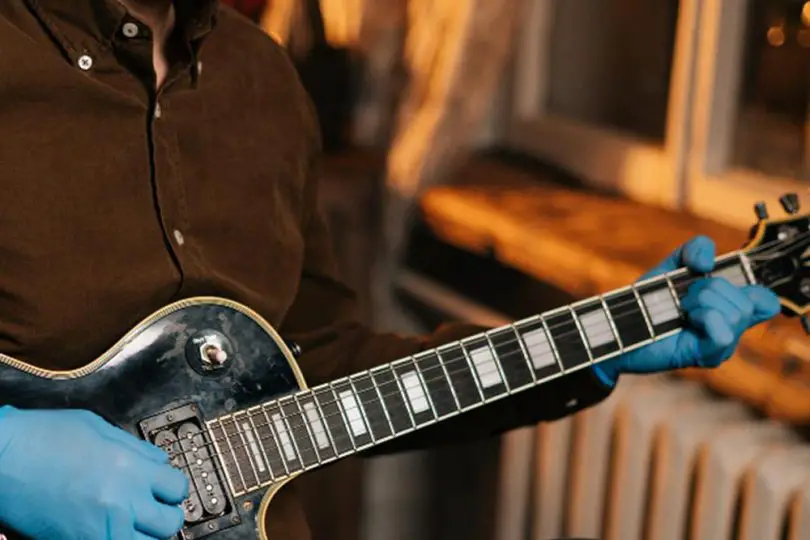There are many reasons why bassists might choose to wear gloves while playing. For one, it can help them grip the instrument better and ensure that their hands stay in the correct position. Gloves can also help protect hands from strings and other elements of the bass that might otherwise cause irritation or injury. Additionally, some bassists feel that wearing gloves makes them play more accurately and with greater precision. Researching the topic, I discovered so many other reasons why. And I’d be pleased to pass them along to you, as well.
Bassists wear gloves for these reasons:
- To prevent blisters on your fingers
- As a means of preventing the fingers from sweating
- In order to keep bass strings from deteriorating too rapidly.
- To dampen the volume of the bass guitar strings.
- As a precaution against frostbite.
- For a smoother play
- Due to a medical issue
If you were under the impression that there is only one explanation, you were mistaken. The motivations of various bassists may differ from one another. In the end, it doesn’t matter how they play the bass with their gloves on as long as they enjoy playing.
Let’s look at these factors in more detail. As a result of this, you may discover a cause to wear gloves while playing.
1. To prevent blisters on the fingers
Finger blisters are a common occurrence for bassists and guitarists alike. Having blisters on your fingers is perfectly natural, especially if you’re a beginner bassist. It can be rather uncomfortable at initially, and many beginners have been discouraged from learning the bass because of finger blisters.
Blisters usually disappear within a few days or a week for the majority of people. After the blisters have healed, you’ll notice that your fingertips have a considerably tougher skin. This tougher skin is known as calluses. You’ll be able to play bass without pain once calluses have formed.
This isn’t the case for everyone, however. After the blisters have healed, there will be no calluses. Gloves are the only defense against blisters in the future for those individuals.
So, if you’re prone to blisters on your bass fingers due to playing, you might want to give playing with gloves a try.
2. Inorder to keep your fingertips from getting too sweaty
Some bassists use gloves to prevent their hands from sweating while they play.
It’s not a secret that some people’s hands sweat naturally. It’s also true for folks who don’t have sweating hands that their hands begin to sweat after playing for an extended period of time, especially on stage. Furthermore, playing bass with moist hands can be downright unpleasant. If you haven’t practiced with sweaty palms and hands, your performance will be sloppy right away.
Bassists often utilize a sweat rag, which they hang from their belt loops. It’s then that they wipe the sweat from their hands between songs during a live performance. Talcum powder is another option for absorbing sweat from the hands, according to some.
Others, on the other hand, like to wear gloves. The gloves aren’t going to stop you from sweating, of course. But they’ll absorb the sweat while you’re playing. This improves your bass guitar’s fretboard grip and keeps your fingertips dry, allowing you to play more comfortably.
3. In order to prevent bass strings from wearing out
For the same reason as sweaty hands, this is relevant. Bassists rarely wear gloves for this reason. Etienne Mbappé, a well-known Cameroonian bassist, protects his instruments’ strings by wearing gloves.
4. To dampen the volume of the bass guitar strings
In order to damper bass strings, the most common method is to use your palms, which is known as palm mute. This is the greatest approach to mute bass strings in my opinion because you have complete control over the sound. However, there are times when you can’t dampen your bass strings with your palm. When you use the bass tapping approach, for example.
Some bassists use a tiny layer of foam between the strings and the fretboard. There is no need to worry about the basses vibrating after you’ve pluck them because of this technique.
There are also gloves. Bassists who wish to use their gloves to muffle their bass do so using gloves that aren’t too tight. To minimize the bass string’s vibration, the gloves must be free around the fingertips.
Wearing oversized gloves as a second method of dampening your bass strings is an option. Your bass strings will be muted with little to no effort from your side thanks to the additional material on the gloves.
4. Warming up the hands while it’s cold
The major function of gloves is to provide warmth for the hands. For the same reason, some bassists wear gloves.
When it’s cold outside, it can be tough to play bass. You lose dexterity when your fingers are cold. It’s hard to move your fingers as quickly when they’re frozen. This is because the blood flow to your fingers decreases when they are cold.
This is why some bassists like to perform with their hands warm by wearing gloves. Then, these are the things I’d personally recommend.
It’s a good idea to practice your bass with gloves if you play a lot of live music and are from a colder state like Minnesota, Alaska, or North Dakota. Get used to playing with gloves since they’ll come in useful when the weather drops and you still have to perform.
5. For a smoother play
Some bass players, it’s true, prefer to play with their hands covered in gloves. Let me give you a little background.
It’s common to have finger soreness when playing bass for long periods of time. Even if you don’t have calluses on your fingers, you will still feel pain. If you haven’t heard of it, it’s likely that you haven’t played bass for long periods of time.
In a cover band, I know a few bassist friends. They can play nonstop for up to six hours at a bar on an average night. In addition, your fingers are bound to hurt after a long period of playing. Using a lot of slides and pops while playing amplifies the discomfort.
They wear gloves to make it easier for their fingertips to play the bass strings. It decreases the friction between their fingers and the strings, allowing you to play bass without pain. And it actually makes playing the bass a lot easier.
It’s much easier to slide across the fretboard smoothly and play with pops when you’re wearing silk gloves.
6. As a result of medical conditions
The medical issues of some bassists necessitate the use of protective gloves. This isn’t all that common, although it does exist in some instances. If you have any of the following medical conditions, you will need to wear gloves when playing bass guitar.
7. Focal dystonia
There is a good chance that Scott Devine is familiar to bass players who are reading this. He’s one of the most popular bass guitar tutors on the internet. More than 800,000 people follow Scott Bass Lessons on YouTube, where he offers bass lessons for all levels of players, from beginners to advanced. With over 10,000 bassists signed up for his online bass lesson course, Essentially, he is an expert on bass guitar.
Scott is virtually always shown playing bass with gloves on in his videos. After years of disregarding criticism about his gloves, he finally decided to explain to his supporters why he wears them.
Focal Dystonia, according to Scott, is a neurological movement disease. His fingers move uncontrollably as a result of this condition. However, the movement of his fingers is halted when something comes into contact with the skin on his hands. In essence, the glove creates the illusion that something is actually contacting his hands, causing the finger movements to cease quickly
8. Allergy to Nickel
Nickel-allergic bassists have no choice but to wear gloves while playing. Nickel allergy, for those who are unaware, is an allergic reaction that occurs when nickel-containing materials are inhaled or come into contact with the skin. Itchy rashes will occur whenever nickel-containing objects come into contact with your skin if you are allergic to the metal.
Nickel is a common material for bass strings. A nickel or stainless steel core is used to make bass strings. As a result, bassists with nickel allergies must wear gloves when playing the bass in order to avoid an allergic reaction.
9. Eczema
Bassists who suffer from eczema on their hands and fingers know how debilitating it can be. As you play, you’ll find yourself repeatedly scrubbing away at an itchy spot. Having itching fingers that turn into sores is beyond agonizing.
Itching and dry hands can be alleviated by wearing gloves. Cotton gloves are the finest choice for people with eczema.
Is there any difference in the sound when bassists wear gloves?
Even if it’s the smallest difference, wearing gloves when playing bass has an impact on the sound. Reduced string noise is achieved by wearing gloves. As a result, you won’t have to deal with any more annoying rattles.
With heavy distortion, the sound of the strings will be enhanced even more. Again, wearing gloves helps to mitigate this issue.
As we discussed earlier, if you don’t wear gloves, your hands will get sweaty and irritated. Sweat and soreness in your hands affect your performance, and this, in turn, affects the sound.
Basically, don’t be afraid. If anything, the difference in quality will be minor.
Is there a specific type of glove for playing the bass that you should use?
Many different types of gloves are available to fit a variety of needs. For example, musicians with Nickel Allergies can use thin silk or nylon gloves. They’re also useful for preventing blisters.
However, cotton gloves or winter gloves are excellent choices for keeping your fingertips warm during the cold winter months.
Alternatives that you can make on your own
We’re aware that money can be an issue from time to time. As a result, we’ve come up with two homegrown options.
-
Talcum powder is a wonderful sweat-absorbing agent.
To clean your hands and bass, you’ll want to use a sweat rag.
Conclusion
To summarize, gloves are essential for a variety of reasons. They’re a useful tool for dealing with health and temperature concerns. Under normal conditions, you may not need them, but I sincerely hope you remember this information the next time you see a bass player with gloves on their hands.







